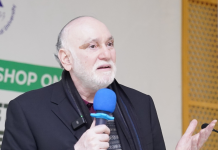‘Leave some cases with us too’, the senior most judge remarked while hearing case in Supreme Court
Special Correspondent
Islamabad: Supreme Court (SC) judge Justice Mansoor Ali Shah on Monday opposed transferring every case to constitutional benches, suggesting that more cases should remain with regular top court benches for efficiency.
Justice Mansoor made the remarks during a hearing on an overbilling case, where the SC judge, speaking to the petitioner’s counsel, advised against forwarding every case to a constitutional bench, noting, “Leave some cases with us too.”
During the proceedings, the petitioner’s counsel argued that the 26th Amendment had introduced new grounds, potentially justifying the case’s referral to a constitutional bench.
However, Justice Shah responded that this particular case did not involve significant constitutional or legal questions, making a constitutional bench unnecessary.
The court subsequently closed the case, noting that appeals regarding previous judgments on overbilling remained pending.
Meanwhile, the Judicial Commission of Pakistan (JCP) is scheduled to convene its first meeting on Tuesday, November 5 to discuss constitutional benches to be formed within the Supreme Court in view of the newly passed 26th Constitutional Amendment and establishment of a JCP secretariat.
The JCP, a body whose one of key tasks is to nominate judges to superior courts—has also been reconstituted in the wake of last month’s constitutional amendments.
According to the notification of the meeting issued by the JCP secretary on Saturday, the commission chaired by Chief Justice of Pakistan (CJ) Yahya Afridi now comprises 12 members including three senior SC judges—Syed Mansoor Ali Shah, Munib Akhtar and Aminuddin Khan.
Other members include Attorney-General for Pakistan Mansoor Awan, Minister for Law Azam Nazeer Tarar and a representative of the bar, Akhtar Hussain Advocate.
The commission now includes four MPs—a senator and an MNA from the treasury benches, a senator and an MNA from the opposition benches. A member has also been nominated for the women’s seat.
Prior to issuance of the notification, National Assembly Speaker Ayaz Sadiq nominated these members to the JCP and later intimated the commission about the decision through a letter.
The speaker nominated NA Leader of Opposition Omar Ayub of the PTI and MNA Sheikh Aftab Ahmed of the PML-N to the commission. He also nominated Senator Farooq Naek of the PPP and Senator Shibli Faraz of the PTI from the Senate as a member of the constitutional body.
Roshan Khursheed Bharucha was nominated as a woman member of the JCP. She hails from Balochistan and is a former senator. This nomination was made as per sub-paragraph (viii) of clause (2) of Article 175A of the Constitution, which permits the speaker to nominate a woman or a non-Muslim to the JCP.
The NA speaker forwarded these names to the commission after consulting with Senate Chairman Syed Yusuf Raza Gillani and all the parliamentary parties. The nomination of names from parliament is on the basis of equal representation from both the government and the opposition.
According to the JCP notification, the commission will convene at the Supreme Court building at 2pm on November 5 to discuss establishment of a secretariat for the commission and nomination of judges for constitutional benches of the Supreme Court.
Constitutional benches have been created at the Supreme Court through an amendment to Article 191-A. “There shall be a constitutional bench of the Supreme Court, which may comprise an equal number of judges from each province,” the amended article states.
These benches will hear original, appellate and advisory jurisdiction of the top court.
On October 21, the controversial 26th Constitutional Amendment sailed through parliament after the ruling coalition succeeded in rallying two-thirds of lawmakers’ support.
The amendments changed the procedure for the selection of the chief justice of Pakistan while also paving the way for formation of constitutional benches in the Supreme Court.

















